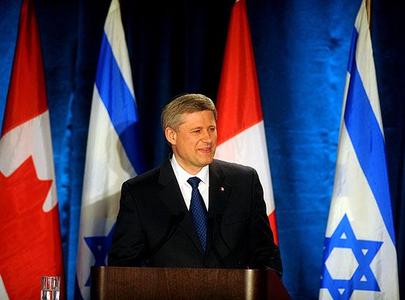

OTTAWA – Victims of terrorism would be able to seek retribution against their attackers in Canadian courts under legislation to be unveiled this week.
"This week in Parliament we will introduce legislation that will give victims of terrorism the power to obtain just compensation from those responsible for their suffering," Prime Minister Stephen Harper told a Canadian Jewish Congress event yesterday in Toronto.
"By amending the State Immunity Act, this bill will allow victims to sue perpetrators and sponsors of terrorist acts, including foreign states, in Canadian courts," Harper said.
The Prime Minister said the new legislation, building on previous private members' bills, would send a "clear message that our government will hold the sponsors and perpetrators of terrorism accountable for their crimes."
Liberal Leader Michael Ignatieff signalled his early support for the idea, which has been around Parliament Hill for several years.
"I have not seen the legislation ... but we have had extensive discussions about civil remedies for victims of terror and we support the principle of this legislation. Now it's simply a matter of details," said Ignatieff, who was also attending the Canadian Jewish Congress event.
Harper said more details would be provided this week when the legislation is unveiled by Public Safety Minister Peter Van Loan
The announcement was greeted with warm applause from members of the Jewish community at yesterday's event and cheered by advocates who have been long seeking legal recourse against terrorists and their supporters.
"The idea is to cut off the flow of money to terrorist organizations because that's what keeps them going. It's also about exposing them for what they're doing. A lawsuit can do that," said Aaron Blumenfeld, a Toronto lawyer with the advocacy group Canadian Coalition Against Terror.
He noted that the record of finding terrorists criminally liable for their actions has been "fairly limited because of the challenges.
"But if you take civil cases, you've got a lower burden of proof," he said in an interview yesterday.
He conceded that the practical aspects of pursuing civil cases against either terrorist individuals or governments are not easy.
"Look, they're not simple cases. A lot of the evidence may be classified. They are complex and may involve a conspiracy that is not easy to prove," Blumenfeld said.
But he noted that strategy has had a "positive track record" elsewhere, notably in the United States, where laws were changed to allow victims to sue backers of terror attackers.
That opened the door to a lawsuit targeting Libya for its role in the 1988 bombing of Pan Am Flight 103 over Lockerbie, Scotland that killed 270 people. Families of the victims sued Libya, which negotiated a $2.7 billion settlement and ultimately got out of the business of supporting terror networks.
"That's an example of actually positively influencing state policy," he said. "It's exposure as well, being in the media. I don't think foreign governments like that."
The coalition represents families of terror attacks, including the Sept. 11, 2001 attacks. Founding director Maureen Basnicki, who lost her husband Ken on 9/11, has been a vocal advocate for change.
"We all must know that money is the lifeblood of terrorism and to be able to go to the transparency of the courts and follow the money trail would give me a great satisfaction and help create that proper legacy for Ken," she told The Canadian Press.
Currently, the State Immunity Act prohibits anyone from taking sovereign states or individuals from abroad to court in Canada, except for business reasons.
A private member's bill introduced in the Senate in 2007 proposed amending the act to allow victims of terrorism to sue here in Canada. That proposal had the support of Amnesty International Canada and human rights lawyers.
If the new legislation is similar to the private member's bill, it would
apply to acts outside Canada, but some Canadian connection would be needed –
such as a Canadian victim or Canadian sponsor of terrorism abroad, Blumenfeld
said.
With files from The Canadian Press